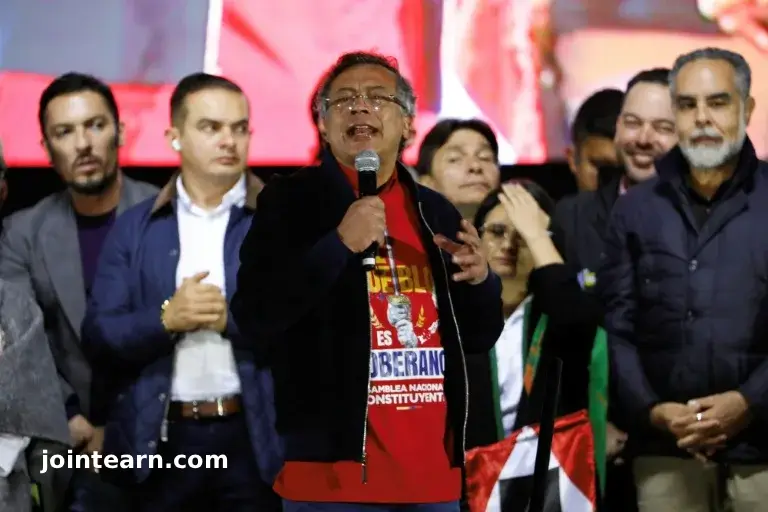
Colombian President Gustavo Petro is reportedly unable to access his salary or use his bank accounts after being placed on a U.S. Treasury sanctions list, his attorney said on Thursday. The latest development adds to mounting financial and diplomatic troubles for Petro’s administration, which has faced growing tension with Washington since the Trump administration imposed sanctions earlier this month.
According to Petro’s lawyer, Daniel Kovalik, the president and his close family members have had their assets and accounts frozen as part of the sanctions issued by the U.S. Treasury’s Office of Foreign Assets Control (OFAC). The measures also restrict U.S.-linked companies from conducting any business with Petro or his government.
Financial Freeze Hits Colombian President and Inner Circle
President Gustavo Petro, along with his wife Veronica Alcocer, his eldest son Nicolas Petro, and Interior Minister Armando Benedetti, were recently added to the U.S. sanctions blacklist. The sanctions — part of a broader effort by the Trump administration to pressure Petro’s leftist government — accuse him of “failing to combat drug trafficking” and allowing cocaine production to rise to record levels in Colombia.
“These sanctions have effectively frozen their financial lives,” Kovalik said in an interview with AFP. “They’ve had their credit cards and bank accounts blocked. Even getting paid as public officials is now difficult.”
Kovalik confirmed that Petro’s presidential salary — which is not publicly disclosed — has been impacted. “He cannot freely access his pay as head of state because the sanctions extend to financial systems with U.S. ties,” he explained.
Sanctions Extend Beyond Banks: Fuel and Logistics Disruptions
The financial restrictions have spilled over into diplomatic logistics. Earlier this week, the Colombian presidential aircraft was denied refueling at Madrid’s Barajas Airport, after the U.S.-affiliated fuel company refused service over fears of violating OFAC regulations. Petro’s team eventually arranged for the aircraft to refuel at a Spanish military base following diplomatic negotiations.
“The ripple effects of these sanctions are immense,” Kovalik said. “They don’t just freeze assets; they disrupt the operations of an entire government.”
Legal Challenge and Diplomatic Negotiations Underway
Kovalik revealed that he plans to challenge the U.S. sanctions both in American courts and directly before the Treasury Department. However, he cautioned that the process will likely be lengthy and complex.
“Either way, it’s going to be a very long and protracted process,” Kovalik noted. “In some cases, these matters are resolved diplomatically through intermediaries — we are working on that possibility.”
He added that Colombian authorities may also explore bringing the issue before international legal bodies, though he acknowledged the limits of such efforts. “Let’s face it: the United States does not answer to anyone else,” Kovalik said.
Petro’s Defense: ‘He Has Fought the Drug Cartels His Entire Career’
Kovalik defended the Colombian president, calling the allegations “politically motivated.” He insisted that Petro has dedicated his political life to confronting corruption and organized crime — not enabling it.
“I’ve known President Petro for over 20 years,” Kovalik said. “He has spent his entire career fighting the drug cartels and exposing ties between the Colombian army and paramilitary groups. The idea that he’s supporting cartels is absurd.”
The lawyer also accused the U.S. administration of targeting Petro for his outspoken criticism of U.S. foreign policy. “This is punishment for dissent,” Kovalik claimed. “It’s a message to all world leaders — if you don’t align with Washington’s interests, you’ll be punished.”
Global Implications of the Petro Sanctions
Experts say the financial freeze marks a significant escalation in tensions between Colombia and the United States, once close allies in counter-narcotics operations. The sanctions risk destabilizing Petro’s government, which is already navigating domestic unrest and strained foreign relations.
The measures could also discourage other governments and private entities from engaging with Bogotá, for fear of secondary sanctions. “Any company or government that works with Petro could face penalties,” Kovalik warned, adding that even humanitarian or commercial agreements could be affected.
Background: Petro’s History of Challenging U.S. Policy
Gustavo Petro, a former left-wing guerrilla and long-time critic of U.S. intervention in Latin America, has been a polarizing figure in international politics. His presidency has emphasized sovereignty, environmental reform, and a break from traditional U.S.-aligned security policies.
His sharp criticism of U.S. military actions in South America — including alleged civilian casualties from anti-drug strikes — has only deepened the divide with Washington. The U.S. Treasury’s decision to freeze his assets appears to be the latest chapter in an ongoing ideological clash between Petro and U.S. leadership.
Conclusion: Diplomatic Strains Deepen
As legal teams prepare to contest the sanctions, President Gustavo Petro continues to face growing isolation on the global stage. The inability to access his own salary symbolizes not just a personal hardship, but a broader test of Colombia’s sovereignty in the face of U.S. financial power.
“This case is about more than just one man’s paycheck,” Kovalik concluded. “It’s about whether a country’s democratically elected leader can govern independently without fear of financial coercion.”


Leave a Reply